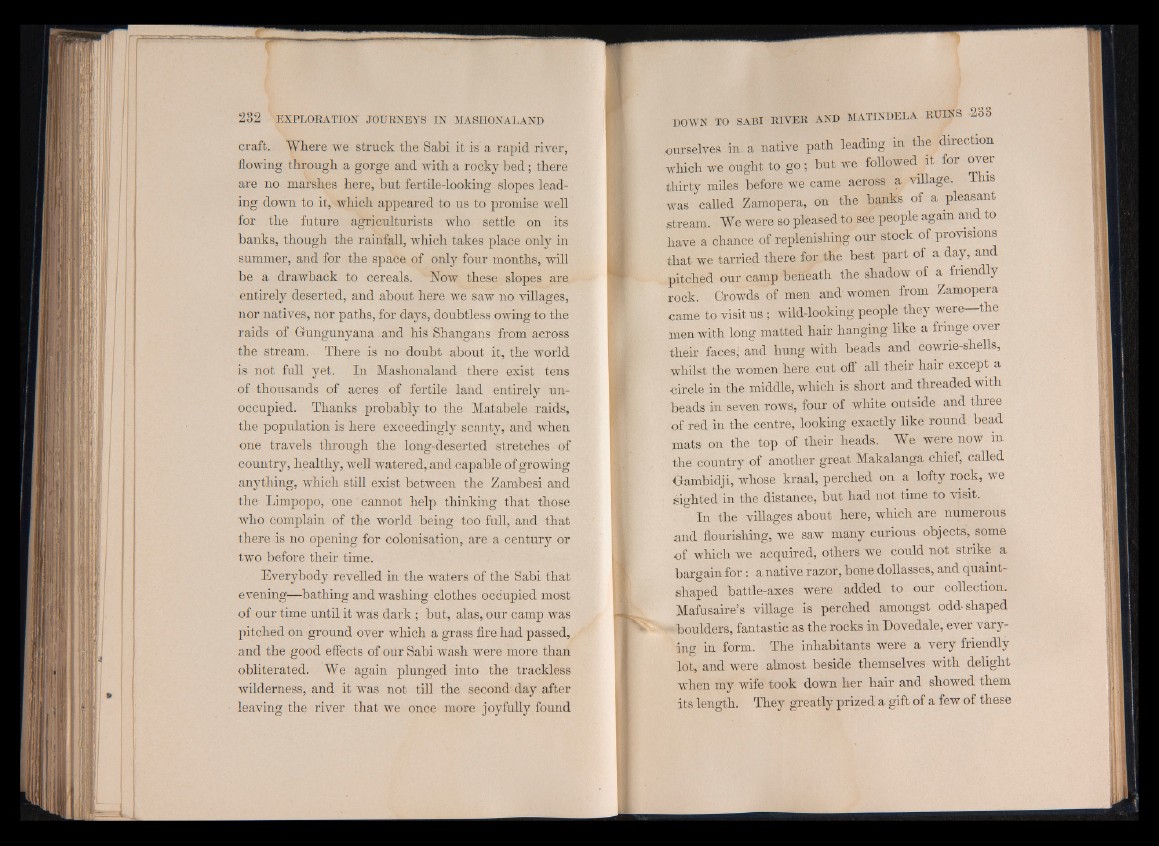
craft. Where we struck the Sabi it is' a rapid river,
flowing through a gorge and with a rocky bed; there
are no marshes here, but fertile-looking slopes leading
down to it, which appeared to us to promise well
for the future agriculturists who settle on its
banks, though the rainfall, which takes place only in
summer, and for the space of only four months, will
be a drawback to cereals. Now these slopes are
entirely deserted, and about here we saw no villages,
nor natives, nor paths, for days, doubtless owing to the
raids of Gungunyana. and his Shangans from across
the stream. There is no doubt about it, the world
is not full yet. In Mashonaland there exist tens
of thousands of acres of fertile land entirely unoccupied.
Thanks probably to the Matabele raids,
the population is here exceedingly scanty, and when
one travels through the long-deserted stretches of
country, healthy, well watered, and capable of growing
anything, which still exist between the Zambesi and
the Limpopo, one' cannot help thinking that those
who complain of the world being too full, and that
there is no opening for colonisation, are a century or
two before their time.
Everybody revelled in the waters of the Sabi that
evening—bathing and washing clothes occupied most
of our time until it was dark ; but, alas, our camp was
pitched on ground over which a grass fire had passed,
and the good effects of our Sabi wash were more than
obliterated. We again plunged into the trackless
wilderness, and it was not till the second day after
leaving the river that we once more joyfully found
ourselves in. a native path leading in the direction
which we ought to g o ; but we followed it for over
thirty miles before we came across a village. This
was called Zamopera, on the banks of a pleasant
stream. We were so pleased to see people again and to
have a chance of replenishing our stock of provisions
that we tarried there for the best part of a. day, and
pitched our camp beneath the shadow of a friendly
rock. Crowds of men and women from Zamopera
came to visit us ; wild-looking people they were—the
men with long matted hair hanging like a fringe over
their faces' and hung with beads and cowrie-shells,
whilst the women here cut off all their hair except a
circle in the middle, which is short a n d threaded with
beads in seven rows, four of white outside and three
of red in the centre, looking exactly like round bead
mats on the top of their heads. We were now in
the country of another great Makalanga chief, called
Gambidji, whose kraal, perched on a lofty rock, we
sighted in the distance, but had not time to visit.
~ In the villages about here, which are numerous
and flourishing, we saw many curious objects, some
of which we acquired, others we could not strike a
bargain for : a native razor, bone dollasses, and quaintshaped
battle-axes were added to our collection.
Mafusaire’s village is perched amongst odd-shaped
boulders, fantastic as the rocks in Dovedale, ever varying
in form. The inhabitants were a very friendly
lot, and were almost beside themselves with delight
when my wife took down her hair and showed them
its length. They greatly prized a gift of a few of these